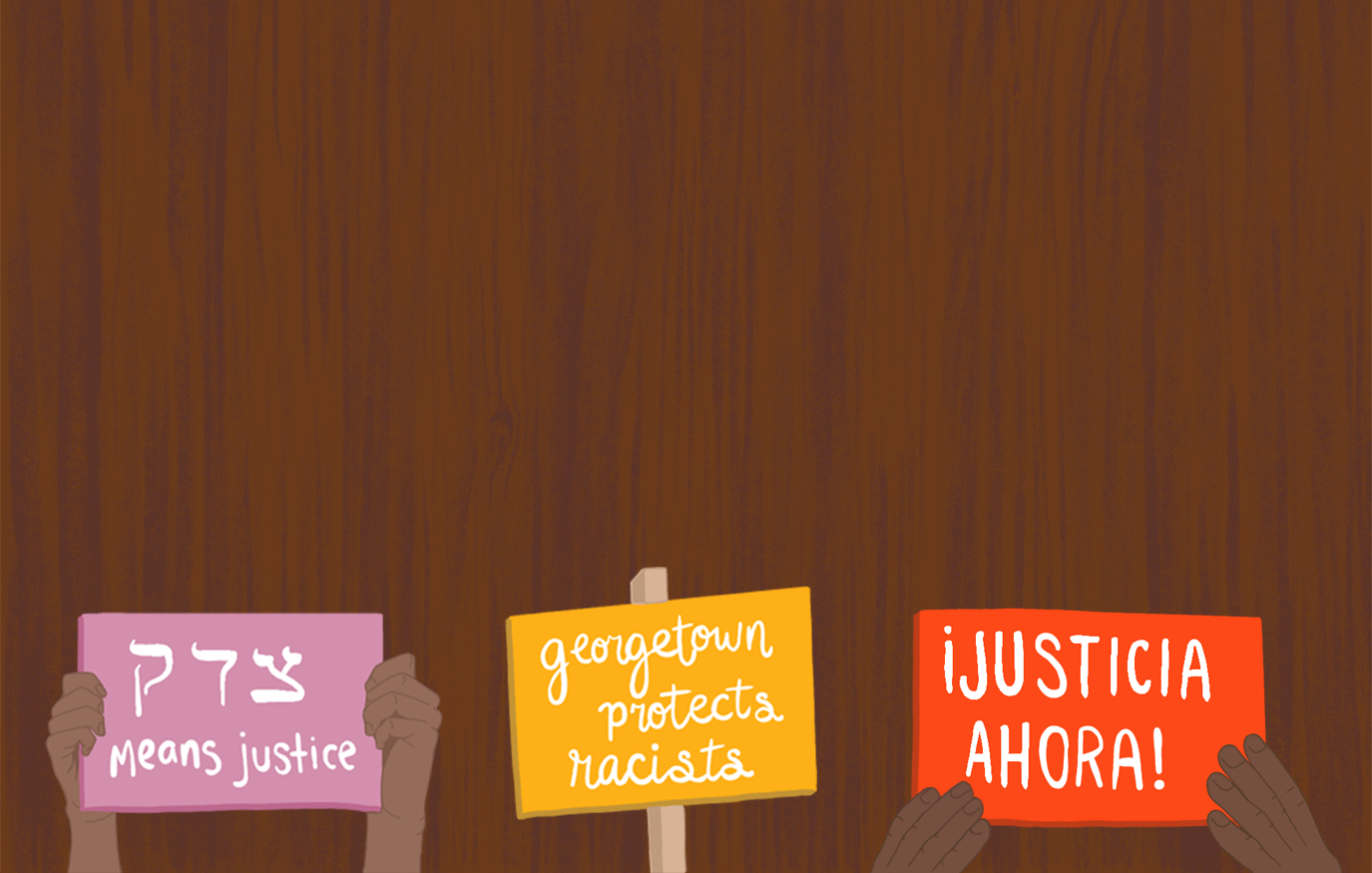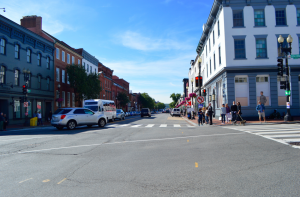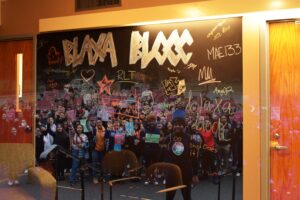Content warning: This article discusses anti-Black hate speech, sexual assault, and systemic violence.
Despite the opportunities of a new year and a new semester, we remain concerned with the ways Georgetown will be the same. More than a month after signaling a willingness to meet the demands of LaHannah Giles (CAS ’23), a survivor of a hate crime on-campus nine months ago, administrators have failed to take any concrete action to achieve justice.
Giles’ demands shouldn’t have had to be made in the first place; the university must thus fulfill their demands now and proactively—not retroactively—support students who have and are experiencing the racist hate that pervades Georgetown moving forward. Giles and other Georgetown Protects Racists (GUPR) organizers continue to put in countless hours of work to elicit concessions from the university—they should never have had to bear that burden. It is the administration’s job to look out for its students; individuals should not have to repeatedly advocate for their basic right to feel safe on this campus.
Acknowledging that the Voice is and has historically been a predominantly White organization, the Editorial Board is committed to uplifting and amplifying Black voices. We encourage our readers to follow GUPR’s Instagram account, participate in future sit-ins and rallies, and stay engaged until the university fully delivers on what it has promised. This Editorial Board believes that even if the university adheres to all of Giles’ demands, that would still be the bare minimum. Rather, the university must develop comprehensive institutional mechanisms to achieve justice for survivors of hate crimes—in the past, the present, and, if necessary, the future.
Following December’s sit-in, the administration originally set a Dec. 17 deadline for the Institutional Diversity, Equity, and Affirmative Action (IDEAA) office to release a report of the investigation and identify the perpetrator. In a Dec. 17 email to Giles, however, the administration indicated that they would be delaying the release of the report until an unspecified date in January, claiming consideration of supposed new information—information which Giles clarified to be old evidence in a new form. Without this report, the Office of Student Conduct cannot hand out sanctions to the perpetrator. The expulsion of the perpetrator is the first of Giles’ listed demands, and the indefinite stalling exemplifies the university’s refusal to take the case seriously while exacerbating the harm already inflicted by the hate crime.
While awaiting a response from the administration (a response that still has not arrived), Giles received an invitation to President John DeGioia’s private Kennedy Center reception for Martin Luther King Jr. Day. It is disgraceful that the administration should think that it would be appropriate to invite students to a private reception while it continues to avoid accountability for a racist hate crime, especially on a day that should have been joyful for the Black community. Celebrating the Rev. Dr. Martin Luther King Jr.’s legacy through award ceremonies while simultaneously neglecting Black students is the embodiment of performative activism and allyship.
On top of postponing the release of the report, the administration conveyed to GUPR organizers over the break that GUPD had become reinvolved in the investigation, but did not provide clarification as to why. Giles expressed their distrust toward GUPD, especially since the department lost the video footage of the suspects entering New South and subsequently deemed the evidence as insufficient.
From the beginning, GUPD has grossly mismanaged Giles’ case. After losing the footage, GUPD failed to provide a well-corroborated narrative on how this happened. The narrative inconsistencies have given Giles reason to believe that GUPD deliberately attempted, in the loss of footage, to erase the hate crime and silence their story.
The loss of the footage is just one of many examples of GUPD’s historically harmful presence on campus, including repeated incidents of racial profiling and aggressive policing of students of color. The vast majority of GUPD’s actual arrests are for victimless substance-related crimes—crimes that have disproportionately incarcerated individuals of color. The Editorial Board has previously echoed the calls of student activists on campus to defund GUPD. Organizations such as Georgetown Emergency Response Medical Service (GERMS) and Counseling and Psychiatric Services (CAPS) could handle nearly all of GUPD’s duties in a trauma-informed, identity-conscious, and accessible way. By diverting funding away from GUPD’s inflated police force to effective crisis response mechanisms, the administration can alleviate some of the harm GUPD has long inflicted on BIPOC communities.
Regardless of how the footage was lost, a university that prides itself on being safe and secure should not be losing footage relevant to crimes committed on campus, footage that could help to convict perpetrators—in this case, a dangerous white supremacist. The fact that this could happen at all is a security breach: It seems unnecessary to have to spell out that footage pertaining to any active investigation should promptly be backed up. If GUPD’s story about an unforeseen server crash is indeed true, this just points to its astonishing incompetence and unwillingness to take incidences of racism seriously. It also brings to light worrying concerns about how frequently evidence may be lost without notification to affected individuals involved in active cases.
This unwillingness is substantiated by GUPD’s initial misclassification of the hate crime as a “bias-related incident” until relentless student activism from Giles and fellow organizers forced the administration to reclassify it as such on Dec. 6. What happened to Giles was unequivocally a hate crime—not a bias-related incident. This misclassification should not be seen as an innocuous slipup. It is a potential violation of the Clery Act, a federal law that requires universities to properly disclose crimes that occur on campus, including racist hate crimes. Georgetown’s guidelines for what constitutes a hate crime versus a bias-related incident are neither clear nor transparent. The vagueness of the term “bias-related incident,” coupled with the administration’s seeming inability to delineate them from hate crimes, has hindered the process of achieving justice for survivors of hate crimes.
Due to the initial misclassification, the hate crime against Giles was also not communicated to the community in its immediate aftermath. In contrast, when antisemitic graffiti and Islamophobic and anti-Indian hate speech took place near campus, the university informed the community of these incidents within 24 hours. The multi-month delay in Giles’ case implies an unwillingness on the university’s part to take accountability for hate crimes, let alone alert the campus community about it.
Georgetown must provide clear and explicit guidelines as to what constitutes a hate crime and be prompt and accurate in reporting them to the community. Whenever a hate crime occurs, Georgetown must provide transparency to the survivor as they handle the case, including updates about what office is investigating the case, when that jurisdiction changes, as well as definitive timelines for when there will be communication.
During the solidarity rally on Dec. 11, GUPR brought together student leaders from a variety of affinity groups—including the Muslim Student Association, the Jewish Student Association, and the South Asian Society—that represent communities that have been hurt by the most recent spate of hate crimes. In line with this message of solidarity, the Editorial Board highlights that the hate pervading Georgetown is not isolated to the Black community; the administration must act to support all of its marginalized communities.
Placing Hoyas in a position where they must fight tooth and nail for basic rights places additional emotional and physical burdens on students, especially students of marginalized identities. Consequently, one of Giles’ demands during the sit-in—which the university has since agreed to—was the extension of the Black Survivors Coalition (BSC) Treatment Initiative. During the 2020 BSC sit-in, students protested the shortage of mental health and sexual assault resources for Black survivors. Consequently, the initiative was introduced in March 2020 to connect survivors—particularly Black, femme, and nonbinary survivors—to mental health providers that are focused on serving communities experiencing racial violence for two years. The editorial board challenges why this initiative was temporary to begin with. Initiatives aimed at developing mental health resources for the Black community should be a permanent element of the university’s healthcare infrastructure, not something students must fight for every five years. The university must proactively provide the resources, space, and funding needed to support Black students and students of color. This Editorial Board demands that the BSC Treatment Initiative receive permanent funding.
Given that Giles and GUPR organizers had to put in this advocacy work anyway, the university should also compensate them, be it financially or through academic support measures. The emotional and physical labor of organizing is incredibly taxing—especially during finals season—let alone how retraumatizing it can be for Giles to repeatedly recount a hate crime to administrators in hostile negotiation spaces. Since it was the university’s own shortcomings that forced students to be activists for themselves, the least it can do at this moment is to appropriately redress the damages it continues to inflict through its active negligence.
The GUPR sit-ins, however, do not just necessitate a greater university response—they also necessitate the entire Georgetown community standing in solidarity with their fellow Hoya. The Editorial Board urges all students to show up at any future activism events organized by GUPR—not merely to move the needle on the administration’s response but also to stand in solidarity with Giles and the Black community.
We are disappointed that there were students who witnessed but did not participate in the rally on Dec. 7. More egregiously, we strongly condemn the students who cut and shoved through protesters; we also condemn Hoyas who hadn’t shown up in any capacity. Even with accessibility concerns, there are various avenues to support the movement such as flyering, raising awareness on social media, donating snacks and water for future sit-ins, or checking in with friends who have participated in in-person programming. This dearth of allyship is incredibly emblematic of the privilege that allows the many white, affluent students on this campus to not care about or engage with systemic racism during their time at Georgetown. Racism does not merely manifest in explicitly malicious words and actions. Microaggressions and passive acceptance of racism are the foundations upon which racist institutions thrive.
Therefore, responsible allyship necessarily entails showing up. Inaction is just another guise that racism adopts. White students and non-Black students of color must proactively advocate for Georgetown’s Black community while also being aware of their positionality. This involves being present at the sit-in and rallies with intentionality, making space for Black students to be heard, and listening with respect.
This hate crime and its subsequent mishandling are far from being isolated incidents: Time and again, Georgetown has shown that it does not care about its marginalized students. The university’s poor communication, lack of transparency, and bungled investigation have only spotlighted its deficient institutional mechanisms to proactively and adequately deal with hate crimes, especially in regard to racism. Simply offering mechanisms of support means nothing if students still have to advocate for their care.
Beyond fulfilling all of Giles’ demands, the university must restructure its institutions to support the students who have experienced racist hate. Specifically, the Editorial Board proposes diverting GUPD funding to more effective support systems, ensuring consistent transparency, and supporting resilient and permanent resources for marginalized communities on campus. In the meantime, the Voice calls on all members of the campus community to stand in solidarity with Giles to hold the university accountable. The sit-ins forced the university to commit to changes, and only continued momentum will push it to follow through. While it should never have taken a sit-in to force Georgetown to condemn a hate crime, the sit-in made clear the power students possess in fighting hate in our university’s institutions and culture. That power stems from community. The Voice stands in solidarity with LaHannah Giles, and we call on all of Georgetown to do the same.




